Acne is a prevalent skin condition that affects millions of people worldwide, especially teenagers and young adults. It occurs when hair follicles are blocked with oil, dead skin cells, and bacteria, resulting in pimples, cysts, blackheads, whiteheads, and other types of blemishes.
Acne is not just a cosmetic concern; it can impact a person's confidence and emotional well-being. While it is commonly associated with adolescence, acne can also affect adults, especially women, due to hormonal fluctuations, stress, and environmental factors. Thankfully, with modern medicine and Ayurvedic treatments, acne can be effectively managed and treated.
Understanding the causes and risk factors of acne is essential in addressing and preventing this skin condition. Acne results from a combination of genetic, hormonal, environmental, and lifestyle factors that affect the skin’s health and function.
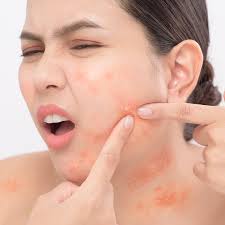
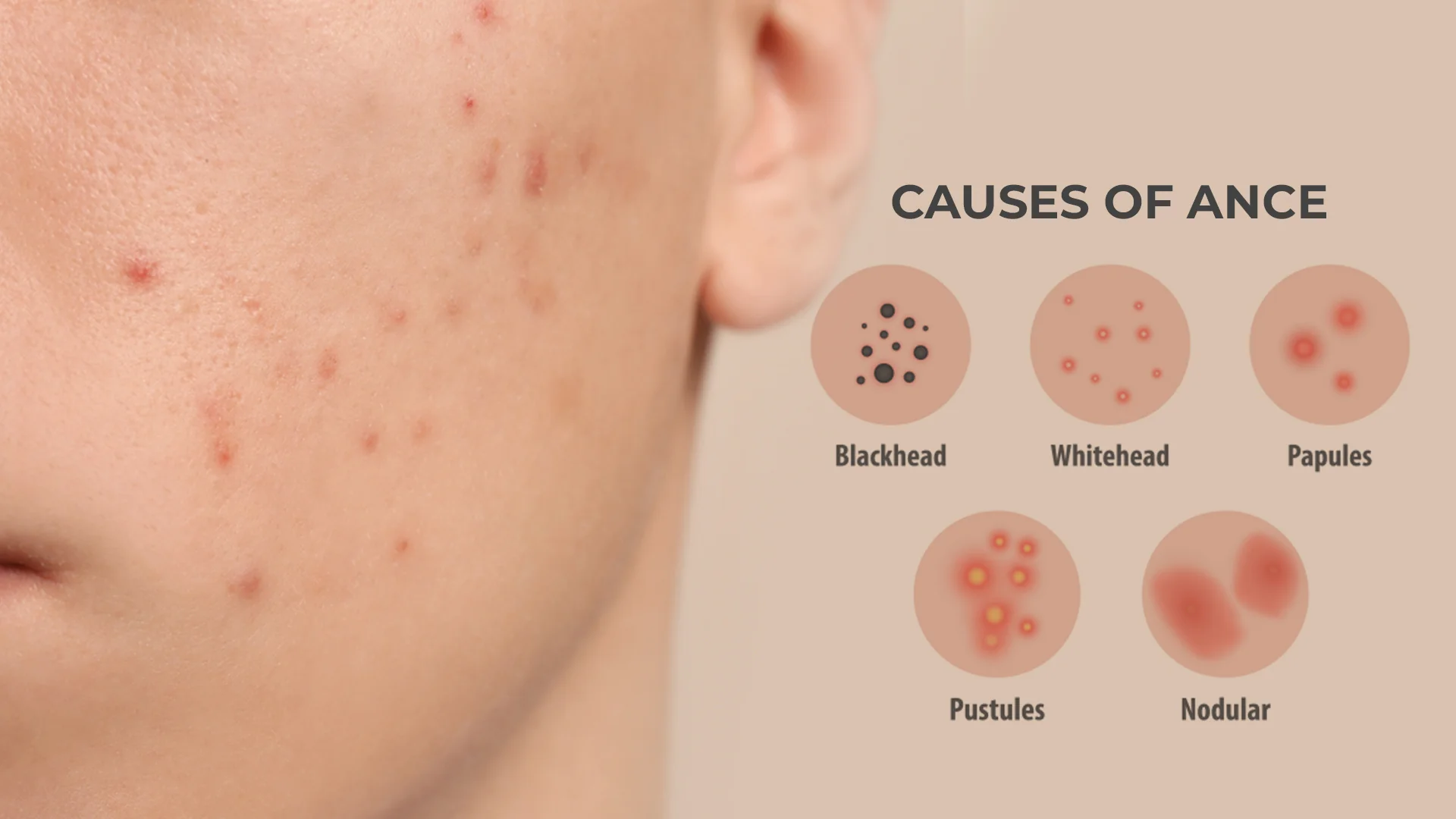
-
Excess Sebum Production
The sebaceous glands in the skin produce sebum, an oily substance that helps lubricate and protect the skin. However, overproduction of sebum, often triggered by hormonal changes, can contribute to clogged pores and acne. This excess oil mixes with dead skin cells, forming plugs that block hair follicles. -
Clogged Hair Follicles
Hair follicles on the skin contain a natural mixture of oil and skin cells. When these follicles become clogged, they create an environment where bacteria can thrive. This is the initial step in the development of acne, leading to the formation of whiteheads, blackheads, and pimples. -
Bacterial Growth
The bacterium Propionibacterium acnes (P. acnes) is naturally found in the skin. When pores are clogged, these bacteria multiply rapidly, leading to inflammation and the formation of pus. This contributes to the redness and swelling associated with acne. -
Hormonal Changes
Hormonal fluctuations are a major trigger for acne, especially during puberty. During this period, the body’s increased production of androgens (male hormones) stimulates the sebaceous glands to produce more oil. Hormonal changes related to menstruation, pregnancy, and the use of birth control can also contribute to acne outbreaks. -
Dietary Factors
Certain foods can exacerbate acne. Diets high in refined carbohydrates, sugars, and dairy products have been associated with acne flare-ups. Foods with a high glycemic index (like white bread and sugary snacks) can lead to increased insulin levels, which in turn increase sebum production. -
Stress
Stress triggers the release of hormones like cortisol, which can increase the production of sebum. Additionally, stress can also disrupt the balance of the immune system, leading to more frequent or severe acne flare-ups. -
Genetics
Genetics play a role in acne development. If your parents had acne, you may be more likely to develop it as well. This is because genetics influence the size and activity of sebaceous glands, which are crucial in acne formation. -
Medications
Certain medications, such as corticosteroids, androgenic steroids, and some types of birth control, can contribute to acne. It’s important to be aware of how medications can affect your skin, particularly if you are prone to acne.
The symptoms of acne vary depending on its severity. Common signs include:
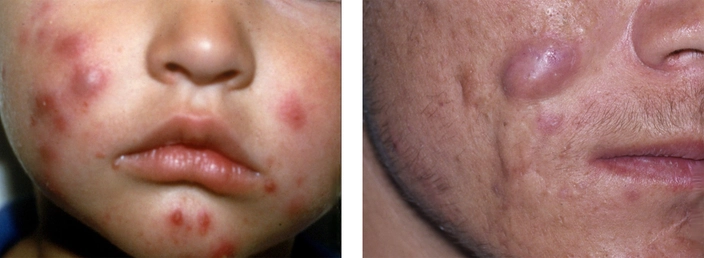
-
Whiteheads
Small, raised white bumps that form when pores are completely clogged. They typically appear on the face, especially around the nose and chin. -
Blackheads
Blackheads form when pores are partially blocked, and the trapped oil oxidizes, turning dark. They are commonly found on the nose and forehead. -
Papules
Red, raised bumps caused by inflammation. They may be tender to the touch and are often an early sign of acne. -
Pustules
Larger, inflamed pimples filled with pus. These are typically painful and may have a white or yellowish center surrounded by redness. -
Nodules
Hard, painful lumps under the skin, formed by severe inflammation. These are often deep-rooted and take a long time to heal. -
Cysts
Painful, deep, pus-filled lesions that often leave scars. Cystic acne is one of the most severe forms of acne and requires medical attention. -
Scarring
Acne scars can result from the damage caused by inflamed cysts or pustules. These scars can be either shallow or deep and may require additional treatment for improvement.
Acne is usually diagnosed through a physical examination by a dermatologist. In Ayurvedic treatment, the diagnosis also includes an analysis of the individual's constitution (Prakriti), lifestyle, and diet, which helps determine the root cause of the imbalance. Additional diagnostic methods may include:
-
Physical Examination
The doctor will evaluate the severity of the acne and assess whether it involves just the surface or deeper layers of the skin. -
Skin Culture
If bacterial infection is suspected, a skin culture may be performed to identify the strain of bacteria causing the acne. -
Blood Tests
Hormonal imbalances or underlying conditions may be checked through blood tests to determine if they are contributing to acne development. -
Lifestyle and Diet Assessment
Ayurveda emphasizes the connection between diet, lifestyle, and skin health. Your Ayurvedic practitioner may ask about your eating habits, stress levels, and overall lifestyle to understand the root cause of acne.
Ayurvedic treatments for acne aim to balance the body's doshas, detoxify the system, and reduce inflammation. Here are the primary Ayurvedic treatment options for acne:
-
Herbal Remedies
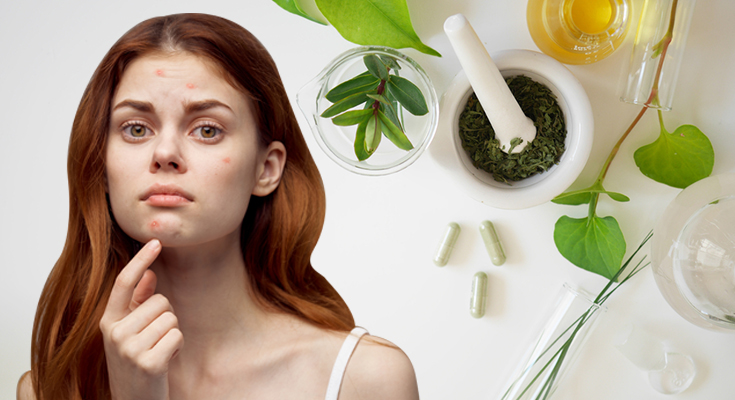
- Neem: Known for its antibacterial and anti-inflammatory properties, Neem purifies the blood and helps treat acne. It is often used in both topical applications and internal remedies.
- Turmeric: A powerful anti-inflammatory and antioxidant, turmeric helps soothe the skin, reduce swelling, and heal acne lesions.
- Aloe Vera: Aloe vera has soothing properties that reduce redness and inflammation, helping to heal acne and prevent scarring.
- Brahmi: This herb is used in Ayurveda to balance Pitta and calm the mind, as stress can worsen acne. It also helps reduce skin inflammation.
-
Panchakarma Therapy
Panchakarma is a detoxification treatment in Ayurveda that helps remove accumulated toxins (Ama) from the body. It includes therapies like Virechana (purgation) and Nasya (nasal cleansing) that promote overall well-being and help prevent acne. -
Abhyanga (Ayurvedic Oil Massage)
Abhyanga is an oil massage technique that helps soothe the skin, improve circulation, and balance the doshas. It is particularly helpful for managing acne by reducing inflammation and promoting skin healing. -
Shirodhara (Oil Pouring Therapy)
Shirodhara involves the gentle pouring of warm oil over the forehead, which helps calm the mind, reduce stress, and restore balance to the Pitta dosha. -
Dietary Changes
Ayurveda recommends a diet that is cooling and anti-inflammatory. Avoiding spicy, oily foods, and incorporating foods like cucumber, coconut, and leafy greens can help reduce the heat in the body that contributes to acne. Drinking herbal teas like turmeric tea or peppermint tea is also beneficial for detoxification. -
Topical Ayurvedic Treatments
- Turmeric and Gram Flour Paste: A mixture of turmeric and gram flour can be applied to the skin as a mask to help reduce acne and clear the skin.
- Honey and Cinnamon Mask: Known for their antibacterial properties, honey and cinnamon can be used to reduce acne and prevent new breakouts.
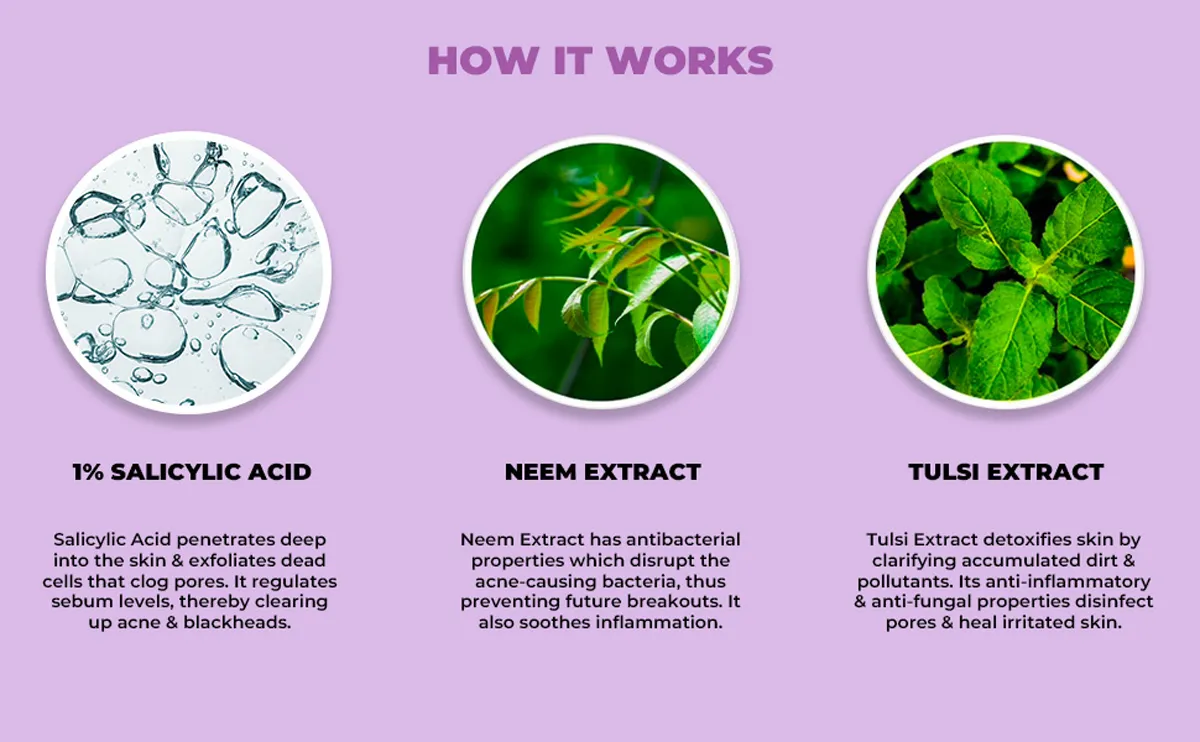
Preventing and managing acne involves making lifestyle adjustments and following a consistent skincare routine. Here are some important tips for managing acne naturally:
-
Gentle Cleansing
Wash your face twice a day with a gentle, non-comedogenic cleanser to remove excess oil and impurities. Avoid using harsh chemicals that can irritate the skin and worsen acne. -
Maintain a Healthy Diet
A diet rich in fruits, vegetables, and whole grains can support skin health. Avoid processed foods, sugary snacks, and dairy, as they can aggravate acne. -
Avoid Touching Your Face
Constantly touching your face transfers bacteria and oils, leading to clogged pores. Keep your hands away from your face as much as possible. -
Stress Management
Practice stress-relief techniques such as yoga, meditation, and deep-breathing exercises to prevent stress-related acne flare-ups. -
Use Non-Comedogenic Products
Always choose skincare and makeup products labeled as “non-comedogenic” to ensure they don’t clog your pores.
If not properly treated, acne can lead to several complications, including:
-
Scarring
Severe acne can leave scars, which may be difficult to treat. Both raised (hypertrophic) and depressed (atrophic) scars can occur, leading to long-term skin damage. -
Psychological Impact
Acne can lead to emotional distress, affecting self-esteem and confidence. The psychological burden of visible acne can sometimes result in anxiety or depression. -
Post-Inflammatory Hyperpigmentation
After acne lesions heal, dark spots may remain on the skin. While these spots typically fade over time, they can be persistent and require additional treatment for complete removal.
Living with acne requires patience, as treatment can take time to show results. However, with consistent care, the right treatments, and lifestyle changes, acne can be effectively managed. Ayurveda offers natural remedies that not only treat the symptoms of acne but also address the root causes, promoting overall health and well-being. It is essential to avoid harsh treatments that could irritate the skin and instead adopt a gentle, holistic approach to healing.
If you are struggling with acne, consulting an Ayurvedic practitioner can provide a personalized treatment plan that balances your doshas and targets the underlying causes of the condition. Remember, you are not alone, and with the right care, clear skin is within reach.
SurgeryPlanet is an Healthcare Facilitator and not a Medical service provider. The information provided in this website is not to be used for diagnosis or treatment of any medical condition or use for any medical purposes. We provide information solely for medical travel facilitation and do not endorse any particular health care provider, hospital, facility, destination or any healthcare service or treatment listed. We are not an agent for, or affiliated to any health care provider, or service listed in our website and is not responsible for health care services provided by them. Choice of hospital or doctor for your healthcare services is your independent decision. Consult your domestic licensed health care provider before seeking the services of any health care provider you learn about from our website.

